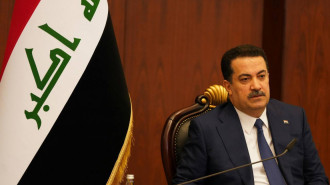Saudi Arabia secretly sentenced women's rights activist and fitness instructor to 11 years in prison
Saudi Arabia secretly sentenced a Saudi fitness instructor and women's rights activist to 11 years in prison, Amnesty International revealed in a statement on Tuesday.
Twenty-nine-year-old Manahel al-Otaibi was sentenced in a secret hearing before the country’s notorious counter-terrorism court, the Specialized Criminal Court, on 9 January 2024, the rights group said, adding that the decision only came to light "weeks later" after UN special rapporteurs requested information about her case.
Otaibi, who is also a blogger, was arrested in November 2022 and disappeared.
In a joint statement, Amnesty and rights group ALQST said that law enforcement targeted Otaibi for challenging Saudi male guardianship laws and requirements for women to wear the customary body-shrouding abaya robe.
The Saudi submission to the UN, however, claimed she "was convicted of terrorist offences that have no bearing on her exercise of freedom of opinion and expression or her social media posts".
The submission does not provide details about the "terrorist offences".
The New Arab has contacted the Saudi embassy in the UK for comment.
Bissan Fakih, Amnesty International’s campaigner on Saudi Arabia, slammed the one-year sentence as "appalling and cruel injustice" and called for her release.
"Since the moment she was arrested, Saudi Arabia's authorities have subjected her to a relentless catalogue of abuses, from unlawful detention for supporting women's rights to enforced disappearance for over five months while she was being secretly interrogated, tried and sentenced and subjected to repeated beatings by others in the prison," Fakih said.
"With this sentence the Saudi authorities have exposed the hollowness of their much-touted women’s rights reforms in recent years and demonstrated their chilling commitment to silencing peaceful dissent."
Tuesday's joint statement from the two rights groups said Otaibi "was forcibly disappeared" from November until mid-April, when she was able to contact her family again.
Her older sister Foz al-Otaibi, followed by 2.5 million people on the social media app Snapchat, said she "faces similar charges, but fled Saudi Arabia fearing arrest after being summoned for questioning in 2022", the statement said.
Foz told AFP on Tuesday that the family only learned of Manahel's 11-year sentence via the Saudi UN submission.
"I feel very shocked," she said, adding that Manahel "did not do anything that deserved to be imprisoned for up to 11 years".
"Saudi authorities must immediately and unconditionally release Manahel al-Otaibi and all those currently detained in the kingdom for the peaceful exercise of their human rights," said Lina al-Hathloul, head of monitoring and communication for ALQST.
"Pending al-Otaibi's release, the authorities must ensure her safety and access to adequate health care."
Saudi Arabia, the world's biggest crude oil exporter, has long been associated with the repression of women due to former rules such as a ban on driving and a requirement to wear abaya robes.
While those restrictions have been lifted, human rights activists say a personal status law that took effect in 2022 still discriminates against women when it comes to matters concerning marriage, divorce, and child-rearing women, and women, including prominent activists, have been rounded up in a wide-reaching campaign against dissent.
Among them are two women who in 2022 received decades-long prison sentences for social media posts critical of the government.
Agencies contributed to this report.







 Follow the Middle East's top stories in English at The New Arab on Google News
Follow the Middle East's top stories in English at The New Arab on Google News

![The new film casts Israeli actors to tell the story of Mary while leaving out Palestinians [Getty]](/sites/default/files/styles/image_330x185/public/2024-11/GettyImages-2172155541.jpg?h=199d8c1f&itok=wJWyXDEQ)
![Ben & Jerry's has taken Unilever to court for its alleged attempts to silence it [Getty]](/sites/default/files/styles/image_330x185/public/2024-11/GettyImages-2183900214.jpg?h=199d8c1f&itok=jEcYtQ64)